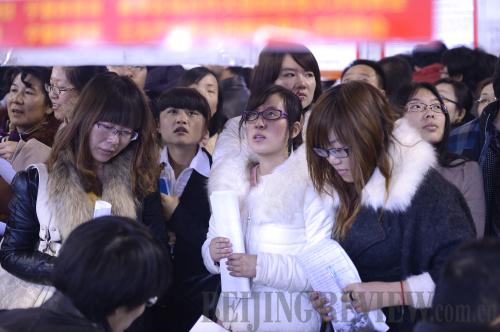|
 |
|
THE HUNT: Women at a job fair in Yinchuan, capital of northwest China's Ningxia Hui Autonomous Region, on February 23 (WANG PENG) |
In Chinese tradition, it is a virtue for women to look after their children and take care of housework in order to support their husbands' careers. However, with the progress of society and the rise of education levels over the past few decades, more and more women are realizing the importance of being independent. As a result, the majority of Chinese women in urban areas are employed. Also, rising living costs mean that men alone cannot support the whole family, pushing women to seek jobs.
According to the Report on Major Results of the Third Survey on the Social Status of Women in China by the All-China Women's Federation published in 2011, 70 percent of urban women aged 18 to 64 are employed, the highest in the world. The survey is conducted every 10 years.
In China, although women's reasons for working differ among individuals and over time, they share one thing in common: They all want to be financially independent.
Financial independence
Dong Shifang, a 30-year-old saleswoman in Laiwu, east China's Shandong Province, used to be a full-time housewife. She gave up work as a cashier after giving birth to her son five years ago in order to look after the baby. However, she resumed employment one and a half years later as a salesperson.
"When I stayed at home with no job, I had to ask my husband for money whenever I needed to buy anything. Now with a salary of 2,000 yuan ($321) a month, I spend my own money," Dong said.
She added that her share of the housework has lessened since she started working again. "In the past, I did most of the house chores. But now my husband does 80 percent as he has more free time."
For Dong, employment makes life more interesting. She started to work again not only because her husband's income alone was insufficient to support the family, but because she felt the need to do so.
"When I was a stay-at-home mom, I knew nothing about what happened outside," Dong said. "Now I talk with my colleagues when I have time at work and I feel very happy."
Dong's case sheds light on the importance of employment among women and how a woman's employment status can affect their family's social status in China.
For Dou Shuofeng, a 55-year-old woman already retired from a hospital job in Shandong Province five years ago, being employed was a big honor.
When she started work in the 1970s after graduating from high school, Dou could obtain work because both her parents held urban hukou or household registrations. A job at a hospital, which is a public institution, meant an "iron bowl" and won her much admiration and respect from her folks.
| 